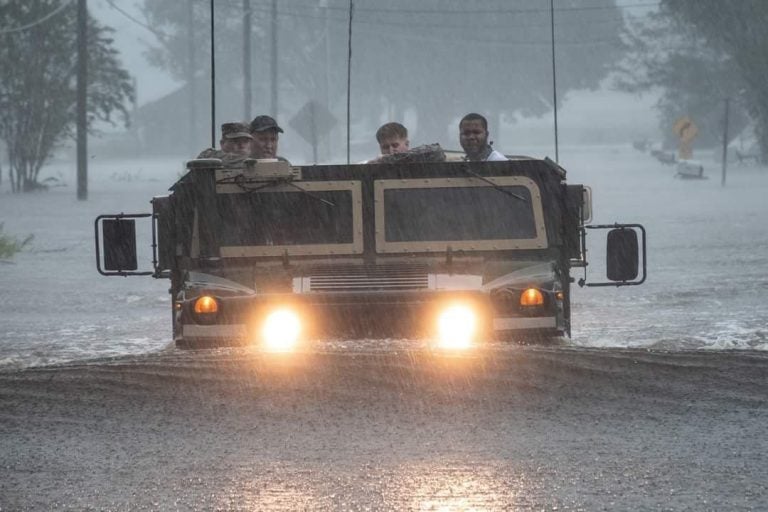As Hurricane Florence ripped through the Carolinas, leaving a swath of destruction and massive flooding in its path, Metcalf Institute alumni sprang into action to cover all aspects of this catastrophic event.
Sarah McCammon, a 2014 Annual Workshop alumna, brought her listeners directly to the people displaced by Florence as she spoke to a family “wading through water up to their knees” in Fayetteville, North Carolina, in her report for National Public Radio. “About 1500 people have evacuated from their homes here.”
Annual Workshop alumnus Tim McDonnell, 2013, looked at what caused people to do just the opposite, to dig in their heels. His piece for Medium.com explored the science of evacuation psychology. “In other words, what motivates some people to pack up and leave at the first sign of trouble and others to fill their bathtubs, board up their windows, and hunker down,” he wrote.
Huffington Post reporter and 2011 Annual Workshop alumna Kate Sheppard examined the hurricane’s environmental impacts in her story as Florence barreled towards North Carolina’s coal ash pits. “Much of the waste is stored in ponds that are unlined or of questionable structural integrity, increasing the possibility that they will leak toxic elements like arsenic, mercury and lead.”
The health dangers posed by Hurricane Florence were also the focus of a story in The Washington Post by 2005 Annual Workshop alumna Carolyn Y. Johnson and her colleagues. Long after Florence’s winds die down, “…its aftermath will still pose life-threatening hazards: snakes, submerged sharp objects, bacterial infections and disease-carrying mosquitoes,” they wrote.
Emily Holden, an alumna of Metcalf’s 20th Annual Workshop this past June, sought the expertise of University of Rhode Island oceanographer Dr. Isaac Ginis for her story for The Guardian exploring the connection between dangerous hurricanes and warming oceans. “…Hurricanes are more likely to become more intense, bring more rain and pose more risks to coastal areas from higher seas and bigger storm surges and waves,” she wrote.
And some reporters, like columnist and 2008 Workshop alumnus Myron B. Pitts, who wrote about Florence extensively for the Fayetteville Observer, hunkered down for a long night in his newsroom as the hurricane churned outside his window. “Stay safe y’all,” he tweeted. “We’re gonna make it through just fine.”

